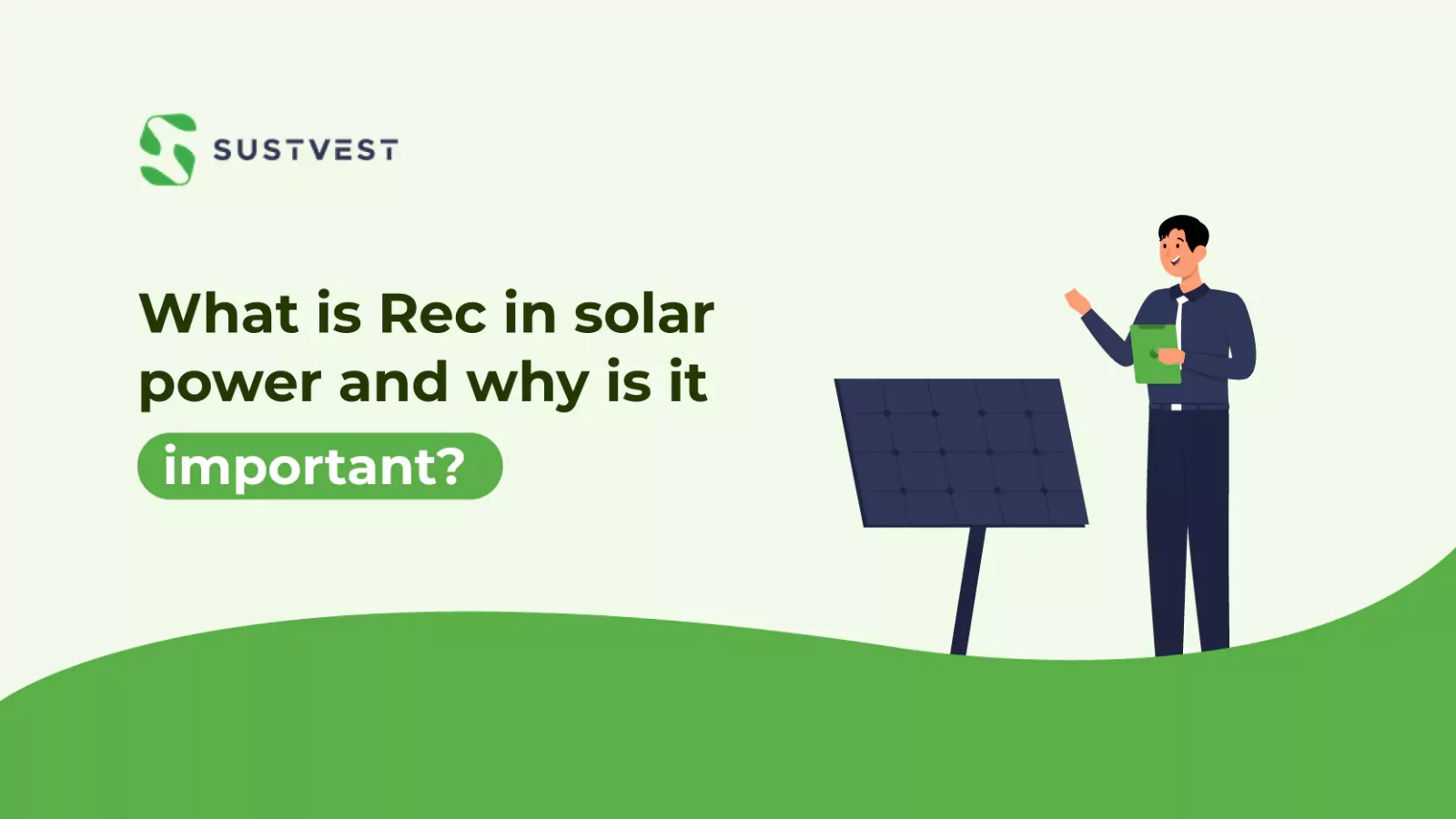Introduction:
What is Rec? The word “Renewable Energy Certificates” or RECs has a lot of significance in the constantly changing world of renewable energy. RECs have become an essential instrument in boosting solar power generation and advancing environmental sustainability as the globe turns toward sustainable energy sources. This in-depth blog digs into the idea of solar energy’s RECs, explaining what they mean and examining how they may help create a better future.

What is Rec?
In simple words, it is a tradable instrument that represents the environmental and social benefits of generating electricity from renewable sources such as solar, wind, hydro, or biomass. When a renewable energy facility produces a certain amount of clean energy, it also generates a corresponding REC. These certificates can be bought, sold, or traded in the market separate from the actual electricity.
Understanding what is Rec serves as a way to track and quantify the contribution of renewable energy to the overall energy mix. Understanding what is Rec plays a crucial role in incentivizing the adoption of renewable energy sources by providing an additional revenue stream for renewable energy producers and allowing consumers, businesses, and governments to meet their what is Rec targets and sustainability goals.
What is Rec in solar power?
In the ever-evolving landscape of renewable energy, Solar Power stands out as a beacon of sustainable progress. Within this realm, an integral instrument called Renewable Energy Certificate (REC) plays a significant role.
How Recs Work in Solar Power:
The procedure for solar power systems starts with the creation of electricity from sunshine. With each unit of clean energy produced, a corresponding REC is also created. These RECs can then be separated from the electricity and traded independently. This separation allows entities, such as utilities, corporations, or individuals, to purchase RECs and claim the environmental attributes associated with the clean energy generation, even if they do not physically use the generated electricity.
Why Rec is important in solar power?
- Growth of Renewable Energy: RECs are essential for encouraging the development of solar energy and other renewable energy sources. RECs promote investment in renewable energy projects by giving a market-based system for pricing and exchanging the environmental benefits.
- Meeting Renewable Energy objectives: As part of their sustainability initiatives, governments, companies, and organizations frequently set renewable energy objectives.
- RECs encourage investments in renewable energy projects.
- Meeting Renewable Energy Goals: Governments, businesses, and organizations often set renewable energy goals as part of their sustainability strategies. RECs enable them to meet these targets by purchasing and retiring certificates, effectively demonstrating their commitment to supporting clean energy generation.
- Financial Support for Solar Projects: Solar power project developers can benefit from an additional revenue stream through the sale of RECs. This supplementary income enhances the financial viability of solar projects, making them more attractive to investors.
- Environmental Impact: By selling RECs, organizations support the shift away from fossil fuels and the decrease of greenhouse gas emissions. This group effort helps to promote a more sustainable energy mix and strengthens the battle against climate change.
What is Rec purpose?
When asked why Renewable Energy Certificates (RECs) exist, the answer is to encourage and promote the production of power from renewable energy sources. A market-based method known as RECs is used to monitor, measure, and exchange the environmental advantages of providing clean and sustainable energy. key purposes of RECs:
Encouragement of Renewable Energy Generation:
RECs give renewable energy producers a financial incentive to generate power from sources like solar, wind, hydro, and biomass. By creating a market demand for clean energy attributes, RECs encourage the growth of renewable energy capacity.
Meeting Renewable Energy Targets:
Many governments, industries, and organizations set renewable energy goals to reduce carbon emissions and promote sustainable practices. RECs enable them to fulfill these targets by purchasing certificates representing the environmental attributes of renewable energy generation.
Market-Based Valuation:
RECs assign a tangible value to the environmental benefits of producing clean energy. This value makes renewable energy projects commercially viable by enabling them to compete on an equal playing field with conventional energy sources.
Flexibility in Compliance
Organizations subject to rules or standards requiring the use of renewable energy can use RECs to satisfy their responsibilities.
They can purchase RECs from renewable energy generators to demonstrate their commitment to sustainability without directly owning or using renewable electricity.
Who issues RECs in India?
In India, understand what is Rec( Renewable Energy Certificates) can be issued by the respective State Electricity Regulatory Commissions (SERCs) or the Central Electricity Regulatory Commission (CERC), depending on the jurisdiction. These regulatory bodies oversee the implementation of the REC mechanism and ensure its proper functioning
What is Rec Regulation in India?
To understand what is Rec Regulation in India refers to the set of rules, guidelines, and mechanisms established by the Central Electricity Regulatory Commission (CERC) and the State Electricity Regulatory Commissions (SERCs) to govern the issuance, trading, and utilization of Renewable Energy Certificates (RECs).
Key Aspects of what is Rec registry include:
- Eligibility Criteria: The regulation defines the eligibility criteria that renewable energy projects must meet to qualify for the issuance of RECs. This includes technical, environmental, and operational requirements that ensure the credibility and authenticity of the certificates.
- Issuance Process: The regulation outlines the process by which renewable energy generators can apply for and receive RECs. It includes procedures for verification of energy generation and certification of eligible projects by the regulatory commissions.
- Trading Mechanism: The REC Regulation establishes the trading platform and guidelines for buying and selling RECs. It sets rules for trading intervals, price discovery mechanisms, and market conduct to ensure transparency and efficiency in REC trading.
- Market Oversight: The regulation assigns responsibilities to the regulatory commissions for overseeing and monitoring the REC market. This includes monitoring trading activities, verifying compliance with regulations, and addressing any market misconduct.
- Compliance and Obligations: The REC Regulation defines the obligations of obligated entities, such as distribution companies and large consumers, to fulfill their renewable purchase obligations (RPOs) through the purchase of RECs. It sets penalties for non-compliance and encourages entities to actively participate in the REC market.
- Reporting and Transparency: The regulation requires regular reporting of REC transactions, issuance, and utilization to ensure transparency and accountability in the market. This information helps stakeholders track progress toward renewable energy targets.
- Renewable Purchase Obligations (RPOs): The REC Regulation aligns with RPOs, which mandate certain entities to procure a specific percentage of their energy consumption from renewable sources. RECs provide a means for these entities to meet their RPOs if they are unable to source enough physical renewable energy.
Conclusion:
In the realm of solar power and renewable energy, RECs stand as a bridge between environmental responsibility and market dynamics. They incentivize solar energy generation, enable the fulfillment of green targets, and contribute to a cleaner energy mix. As the global push for sustainable practices gains momentum, RECs play a crucial role in shaping a future powered by clean, reliable, and eco-friendly solar energy.

Founder of Sustvest
Hardik completed his B.Tech from BITS Pilani. Keeping the current global scenario, the growth of renewable energy in mind, and people looking for investment opportunities in mind he founded SustVest ( formerly, Solar Grid X ) in 2018. This venture led him to achieve the ‘Emerging Fintech Talent of the Year in MENA region ‘ in October 2019.




